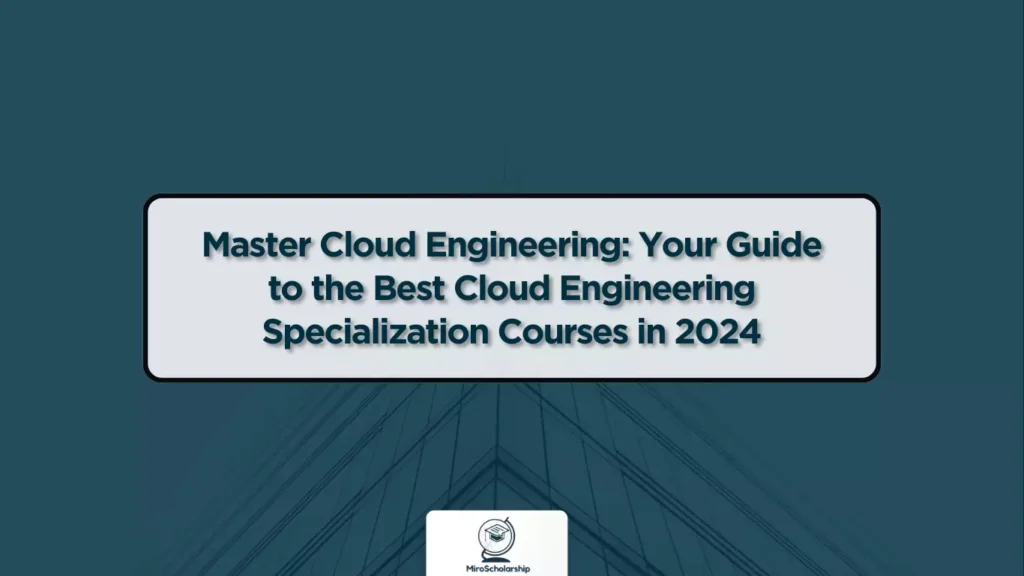Introduction
In today’s technology-driven landscape, cloud computing is a game-changer, enabling businesses to store, manage, and process vast amounts of data efficiently. As organizations migrate to the cloud to enhance scalability, security, and flexibility, the demand for skilled cloud engineers is skyrocketing. If you’re aiming to build a career in this dynamic field, a Cloud Engineering Specialization provides a structured pathway to mastering cloud technologies. This article outlines everything you need to know about this specialization, including its course structure, skills acquired, and why it’s an ideal choice for aspiring cloud engineers.
What is Cloud Engineering?
Cloud Engineering focuses on designing, implementing, and managing cloud computing solutions. It combines expertise in cloud platforms, networking, system administration, and security to deploy scalable and reliable cloud environments. Cloud engineers use platforms like Amazon Web Services (AWS), Microsoft Azure, and Google Cloud Platform (GCP) to develop infrastructure that meets organizational needs.
The Cloud Engineering Specialization equips you with the skills to design cloud architecture, deploy resources, manage cloud security, and automate tasks using Infrastructure-as-Code (IaC). Whether you’re looking to transition into cloud computing or advance your IT career, this specialization is a valuable asset in today’s job market.
What Does the Cloud Engineering Specialization Include?
The Cloud Engineering Specialization is a multi-course program covering the core aspects of cloud computing. Below is a breakdown of the courses and what each module entails.
-
Introduction to Cloud Computing
This foundational course introduces the concepts of cloud computing, cloud service models (IaaS, PaaS, SaaS), and deployment models (public, private, hybrid). You’ll explore the benefits and challenges of adopting cloud solutions and learn the basics of cloud platforms like AWS, Azure, and GCP.
Key Topics:
- Cloud computing fundamentals
- Service and deployment models
- Overview of leading cloud providers
- Setting up a basic cloud environment
-
Cloud Architecture and Design
Learn how to design scalable, resilient, and cost-effective cloud architectures. This course dives into best practices for cloud resource optimization and introduces architectural frameworks like AWS Well-Architected Framework.
Key Topics:
- Principles of cloud architecture
- Load balancing and auto-scaling
- Designing for high availability and fault tolerance
- Cost management strategies
-
Infrastructure as Code (IaC)
Automation is a cornerstone of cloud engineering. This module covers IaC tools like Terraform, AWS CloudFormation, and Ansible, teaching you to provision and manage infrastructure through code.
Key Topics:
- Introduction to Infrastructure-as-Code
- Writing Terraform configurations
- Automating deployments with CloudFormation
- Version control for infrastructure
-
Cloud Security
Security is critical in cloud computing. This course teaches you how to implement security measures to protect cloud resources, data, and applications. Topics include Identity and Access Management (IAM), encryption, and monitoring.
Key Topics:
- Cloud security best practices
- Identity and Access Management (IAM)
- Network security and firewalls
- Data encryption and compliance
-
DevOps in the Cloud
Modern cloud engineering integrates DevOps practices to streamline development and deployment. Learn how to use tools like Docker, Kubernetes, and CI/CD pipelines to enhance efficiency.
Key Topics:
- Introduction to DevOps concepts
- Containerization with Docker
- Orchestrating containers with Kubernetes
- Building CI/CD pipelines in the cloud
-
Cloud Engineering Capstone Project
The capstone project is an opportunity to apply all the skills you’ve learned to a real-world scenario. You’ll design, deploy, and secure a cloud-based solution, presenting your work as a portfolio project.
Key Topics:
- Cloud architecture design
- Automation with IaC tools
- Implementing security measures
- Project documentation and presentation
Skills You’ll Gain from the Cloud Engineering Specialization
- Cloud Platform Expertise: Gain hands-on experience with leading cloud platforms like AWS, Azure, and GCP. You’ll learn to deploy and manage resources, configure services, and optimize performance.
- Automation and Scripting: Master automation tools like Terraform, Ansible, and CloudFormation to streamline cloud deployments. Learn scripting in Python or Bash for task automation.
- Security Best Practices: Understand how to secure cloud resources by configuring IAM policies, encrypting data, and monitoring threats.
- Containerization and Orchestration: Develop skills in containerization with Docker and orchestration using Kubernetes, enabling you to manage applications in the cloud.
- Cloud Cost Optimization: Learn how to monitor and optimize costs to create cost-effective cloud solutions that align with business needs.
Why Should You Pursue the Cloud Engineering Specialization?
- High Demand for Cloud Skills: Cloud engineering roles are among the fastest-growing in IT. By mastering these skills, you’ll position yourself as a valuable asset to organizations transitioning to the cloud.
- Diverse Career Opportunities: This specialization opens doors to roles like Cloud Architect, DevOps Engineer, and Cloud Security Specialist, offering flexibility in career paths.
- Hands-On Learning: With real-world projects, you’ll build a portfolio demonstrating your ability to design, deploy, and manage cloud solutions.
- Learn from Experts: The specialization is taught by industry professionals and cloud-certified experts, ensuring you gain practical knowledge.
Where to Learn Cloud Engineering
Platforms like Coursera, edX, and Udemy offer Cloud Engineering Specializations in partnership with top universities and tech giants. Examples include the AWS Cloud Practitioner Path or Microsoft Azure Certification Programs. Many courses provide free access to materials, with optional paid certifications.
Conclusion: The Path to Becoming a Cloud Engineer
The Cloud Engineering Specialization provides a comprehensive learning path for anyone interested in cloud computing. From mastering cloud platforms to securing and automating cloud infrastructure, this program equips you with the expertise to thrive in the ever-evolving IT landscape.
With the skills, hands-on projects, and certifications you’ll gain, you’ll be ready to take on exciting opportunities in one of the most in-demand fields of the tech industry.
Read More: Top Pharmacy Specializations for a Thriving Career in 2024

